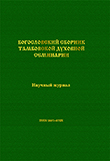The Living Word of Orthodoxy
Keywords:
Church Slavonic language, literary Russian language, Church Slavonic elements in the Russian language, Russian dialects, colloquial speech, Christian symbols, folk etymology, Church Slavonic literature, “active” and “passive” Church Slavonicisms, Christian vocabulary, “language of folk Orthodoxy”, codified literary language.Abstract
The vocabulary of Christian truths, the Gospel and sermons initially created the Russian literary language. Liturgical texts, church rituals, icon painting, hymnography, bookishness - the lives of saints, teachings, sermons, paroemia sayings, instructions on monastic life - made up the wealth of Russian culture and the Russian language, expanding the existing system of ethnic worldview. Christianity rose above the concepts of tradition and culture, it united humanity with the higher world - the world of God. The literary Russian language was formed under the influence of the apostolic heritage of Saints Cyril and Methodius. Church Slavonic left a deep mark on the literary Russian language. Having entered the Russian language and become a part of it, it formed the Russian mentality, the epistemology of the unearthly mind, addressed to earthly life. Church Slavonic bookishness created the Russian literary language. The study of Church Slavonic elements in the Russian language has always been considered one of the most important tasks in the study of its history. At the same time, the influence of the Church Slavonic language on Russian dialects has been almost completely unstudied. Based on the current state of dialect systems as a whole, we can confidently speak of the literary Russian language as the main source of the formation of Christian vocabulary for the dialect. In relation to the Church Slavonic language, this will be a secondary source, an intermediary that has adopted the system of moral values of Christianity from its bookish, translated predecessor. Considering the relationship between Christian vocabulary in different language systems, we must be aware that the area of expression of religious meanings is within the codified literary language and colloquial speech, which make up the “system of systems” - the Russian language. The terms “codified literary language” (CL) and “colloquial speech” (CSP) were defined in the well-known collective work “Russian Colloquial Speech” (1973), where they are contrasted as different language systems functioning in the same language community. In this case, colloquial speech is understood to mean any speech in oral form, any speech of the urban and rural population, everyday speech of speakers of the literary language, containing a factor of ease. The adapted part of the Church Slavonic language enters the dialects through the Russian literary language. Christian vocabulary in dialects is involved in the language system of each of the dialects, taking into account its inherent features. Striving for its genetic source, Christian vocabulary in dialects performs a consolidating function, bringing dialects closer to the Russian literary and Church Slavonic languages.
Downloads
References
1. Повесть временных лет // Памятники литературы Древней Руси: Начало русской литературы XI - начало XII века / Вступит. ст. Д.С. Лихачева. М., 1978. С. 42-43.
2. Шахматов А.А. Очерк современного русского литературного языка. Л., 1925. С. 12.
3. Дубровина С.Ю. Народная этимология в лексике веры и церкви // Этимологические исследования: Сб. науч. тр. Екатеринбург, 2003. Вып. 8. С. 172-177; Ее же. Вариантное прочтение содержания языкового знака при мотивации, основанной на случайных сближениях // Вестник Московского университета. Серия 9. Филология. М., 2005. № 5. С. 124-130.
4. Иванова А.Ф. Словарь говоров Подмосковья. М., 1968. С. 337.
5. Даль В.И. Толковый словарь живого великорусского языка. В 4 т. М., 1994. Т. I. С. 25.
6. Порохова О.Г. Лексика сибирских летописей XVII века: Дис. канд. филол. наук. М., 1952. С. 400, 401.
7. Филатова В.Ф. Акциональная церковная лексика в составе обрядовой (на материале говоров восточной части Воронежской области) // Лексический атлас русских народных говоров. 1995: Материалы и исследования. СПб., 1998. С. 80-81.
8. Фасмер М. Этимологический словарь русского языка. В 4 т. М., 1986. Т. II. С. 142.
9. Ожегов С.И. Словарь русского языка // Под ред. чл.-корр. АН СССР Н.Ю. Шведовой. 18-е изд., стереотип. М.: Рус. яз., 1987. С. 221.
10. Там же.
11. Там же. С. 632.
12. Русская разговорная речь / Отв. ред. Е.А. Земская. М., 1973. С. 5, 23.
REFERENCES
1. Povest' vremennyh let // Pamyatniki literatury Drevnej Rusi: Nachalo russkoj literatury XI - nachalo XII veka / Vstupit. st. D.S. Lihacheva. M., 1978. S. 42-43.
2. Shahmatov A.A. Ocherk sovremennogo russkogo literaturnogo yazyka. L., 1925. S. 12.
3. Dubrovina S.Yu. Narodnaya etimologiya v leksike very i cerkvi // Etimologicheskie issledovaniya: Sb. nauch. tr. Ekaterinburg, 2003. Vyp. 8. S. 172-177; Ee zhe. Variantnoe prochtenie soderzhaniya yazykovogo znaka pri motivacii, osnovannoj na sluchajnyh sblizheniyah // Vestnik Moskovskogo universiteta. Seriya 9. Filologiya. M., 2005. № 5. S. 124-130.
4. Ivanova A.F. Slovar' govorov Podmoskov'ya. M., 1968. S. 337.
5. Dal' V.I. Tolkovyj slovar' zhivogo velikorusskogo yazyka. V 4 t. M., 1994. T. I. S. 25.
6. Porohova O.G. Leksika sibirskih letopisej XVII veka: Dis. kand. filol. nauk. M., 1952. S. 400, 401.
7. Filatova V.F. Akcional'naya cerkovnaya leksika v sostave obryadovoj (na materiale govorov vostochnoj chasti Voronezhskoj oblasti) // Leksicheskij atlas russkih narodnyh govorov. 1995: Materialy i issledovaniya. SPb., 1998. S. 80-81.
8. Fasmer M. Etimologicheskij slovar' russkogo yazyka. V 4 t. M., 1986. T. II. S. 142.
9. Ozhegov S.I. Slovar' russkogo yazyka // Pod red. chl.-korr. AN SSSR N.Yu. Shvedovoj. 18-e izd., stereotip. M.: Rus. yaz., 1987. S. 221.
10. Tam zhe.
11. Tam zhe. S. 632.
12. Russkaya razgovornaya rech' / Otv. red. E.A. Zemskaya. M., 1973. S. 5, 23.
Downloads
Published
License
Copyright (c) 2025 Theological Collection of Tambov Theological Seminary

This work is licensed under a Creative Commons Attribution-ShareAlike 4.0 International License.

